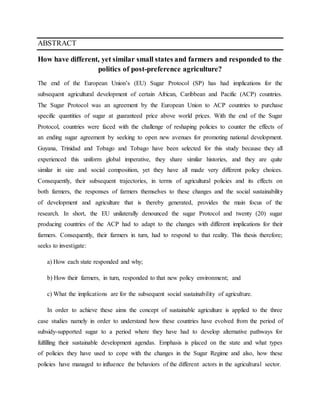
ABSTRACT
- 1. ABSTRACT How have different, yet similar small states and farmers and responded to the politics of post-preference agriculture? The end of the European Union’s (EU) Sugar Protocol (SP) has had implications for the subsequent agricultural development of certain African, Caribbean and Pacific (ACP) countries. The Sugar Protocol was an agreement by the European Union to ACP countries to purchase specific quantities of sugar at guaranteed price above world prices. With the end of the Sugar Protocol, countries were faced with the challenge of reshaping policies to counter the effects of an ending sugar agreement by seeking to open new avenues for promoting national development. Guyana, Trinidad and Tobago and Tobago have been selected for this study because they all experienced this uniform global imperative, they share similar histories, and they are quite similar in size and social composition, yet they have all made very different policy choices. Consequently, their subsequent trajectories, in terms of agricultural policies and its effects on both farmers, the responses of farmers themselves to these changes and the social sustainability of development and agriculture that is thereby generated, provides the main focus of the research. In short, the EU unilaterally denounced the sugar Protocol and twenty (20) sugar producing countries of the ACP had to adapt to the changes with different implications for their farmers. Consequently, their farmers in turn, had to respond to that reality. This thesis therefore; seeks to investigate: a) How each state responded and why; b) How their farmers, in turn, responded to that new policy environment; and c) What the implications are for the subsequent social sustainability of agriculture. In order to achieve these aims the concept of sustainable agriculture is applied to the three case studies namely in order to understand how these countries have evolved from the period of subsidy-supported sugar to a period where they have had to develop alternative pathways for fulfilling their sustainable development agendas. Emphasis is placed on the state and what types of policies they have used to cope with the changes in the Sugar Regime and also, how these policies have managed to influence the behaviors of the different actors in the agricultural sector.